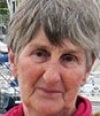Citizen Sea’s latest recruit left school at 16 with one GCSE (General Certificate of Education) and now she is a Marine Biologist who has just handed in her PhD on Invasion Ecology. Monica McCard is the new Project Co-ordinator for the Citizen Sea charity.
Citizen Sea is Northern Ireland’s first boat based environmental charity. Its aim is to inspire people through experiences at sea, to love, protect and appreciate the marine environment. To this end Citizen Sea engages with people through citizen science, practical action, and education. The project is based on a vessel moored in Bangor Marina and currently in Belfast Harbour.
Monica who hails from Lisburn near Belfast always had a passion for anything that lived on our coast and under the sea. Then as a mother of three boys, Nathan, Matthew and Callum (Nathan has just graduated in Marine Ecology from Bournemouth University), Monica realised she wanted more for herself and her children. So, in her thirties she got the opportunity to study at the South Eastern Regional College (SERC) Restart and Access course in her home town, and went on to graduate from Queen’s University in Belfast.
Monica spent some time abroad on Hoga Island Marine Station in Indonesia working with Operation Wallacea, a biodiversity and climate research organisation. She said that her first introduction to Lionfish was diving on coral reefs there, and that ignited the idea for her PhD.
 Citizen Sea
Citizen Sea
The Belfast Telegraph says that Monica credits the SERC Access course with transforming her life: "My access course set everything in motion. If I hadn't done it, I wouldn't be doing what I'm doing now, and I am doing what I love."
Her enthusiasm for her chosen career includes co-authoring three academic studies as well as one of her own on invasive species, and she has set up a programme called Marine Explorers Outreach which starts this month. It encourages children aged 11 to18 to be more inquisitive about the marine life on our shores. It will run once a month for six months based at the Queen’s University Marine Laboratory at Portaferry on Strangford Lough in collaboration with Citizen Sea.
Monica is enthusiastic about her path in life; “I was always obsessed with being around the water as a kid; there is nothing more calming than listening to the sounds of the waves. I got very interested in watching documentaries on life in the sea and wondered why people often felt like they had to go to foreign countries to see amazing creatures when we have it all on our doorstep. Our waters are teaming with the most incredibly diverse species, and I want to do all I can to share that with as many people as possible and protect what we have here. We have barely scratched the surface of our knowledge on what lives in the oceans, that is what excites me!”
More information about the Explorers here

































































